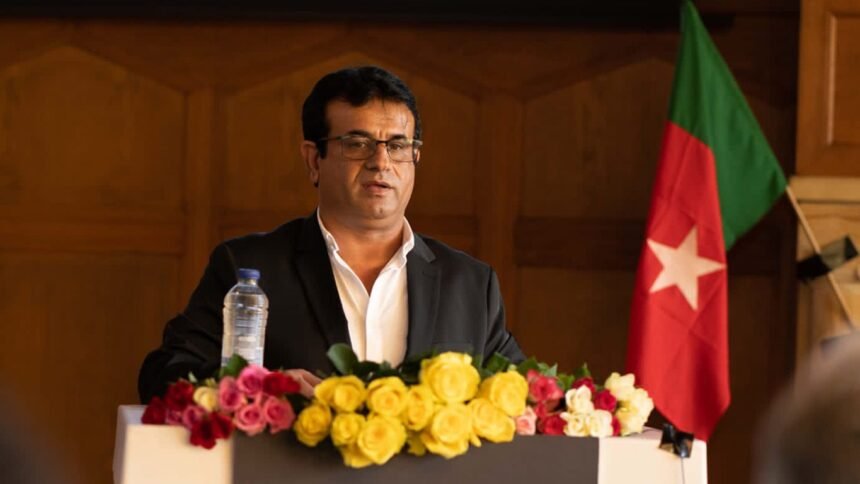Chairman Baloch National Movement Dr. Naseem Baloch addressed a side event organized by a Japanese NGO, International Career Support, presided by Shun Fujiki
Date: 28 September
Location: Geneva, Switzerland
Topic : CPEC: China-Pakistan Economic Corridor
Transcript of speech:
Ladies and gentlemen,
First of all, I would like to thank central Asia, 25 countries in East Asia and the Pacific, as well as the Middle East. Furthermore, it includes 17 North African nations, 18 countries in Latin America, and the Caribbean organisers for inviting me to this important event.
As you are aware that China’s ambitious ‘Belt and Road’ project has extended its reach to over 100 countries worldwide. This initiative spans across 38 countries in sub-Sahara Africa, 34 countries in Europe and Cn region, along with 6 Southeast Asian countries. However, its cornerstone project is undoubtedly the “CPEC,” with Gwadar Port and the vast expanse of Balochistan at its core. Without it, the grand vision of the “One Belt One Road” project would remain incomplete.
When the CPEC project was initiated, the Baloch nation made an urgent appeal to the civilised nations of the world. They conveyed that this project was not merely a venture aligned with democratic and humanitarian values but rather an imperialist endeavour with aims to usurp (grab) Baloch land and alter its demographics. Additionally, it sought to shift the regional balance of power in favour of those behind it, thereby affecting the interests of India, Japan and other major powers. Regrettably, our plea went unheard, and we were left to face this monumental challenge alone.
At the heart of the CPEC lies Gwadar, boasting a deep-sea port and serving as the passage for the CPEC route through the vast )land) terrain of Balochistan. While the world was presented with a facade of Chinese products traveling from Kashgar to the rest of the world via Gwadar Port, the true intentions of China were far more diasterous. sinister. China aspired to secure control over the strategically vital “Strait of Hormuz” through Gwadar and establish a military presence in key locations, including Balochistan. There are strong evidence of Chinese maritime presence in Gwadar district.
Ladies and gentlemen,
The centrepiece of a multi-billion-dollar project like CPEC involved the plan to displace the entire local population of Gwadar, a scheme that continues to employ various tactics to this day. Simultaneously, entire populations have been uprooted from areas traversed by the CPEC route, resulting in mass migration from their homeland. Thousands have lost their lives, and others have been forcibly disappeared by the Pakistani military.
In light of the Baloch nation’s determination to defend their way of life, the army established a special brigade, with a minimal cost of 250 million US dollars. This brigade’s primary mission was to eliminate nearby settlements along the CPEC route, making the residents victims of forced migration to weaken Baloch resistance. Meanwhile, we continued to remind the world that this was not just a Baloch issue; it would also impact global interests in the region. It would tighten the encirclement around India, placing the Strait of Hormuz under China’s influence. Unfortunately, our warnings were largely ignored, and perhaps the world didn’t believe that the Baloch could withstand this huge project. However, the Baloch nation valiantly rose to fight this imperialist endeavor, embarking on an unprecedented journey of sacrifice. The Baloch resistance employed a combination of classical and modern guerrilla warfare, with a particular focus on countering the Pakistani army. Both China and Pakistan found themselves ill-equipped to deal with this modern, self-sacrificing Baloch resistance. Consequently, they turned their wrath towards the civilian population. Yet, the people persisted in supporting the Baloch resistance because they understood that this was a battle for survival.
The results are evident before our eyes. All of China’s projects in Balochistan remain in limbo. Gwadar Port stands empty, with not a single Chinese container having traversed the extensive CPEC route to date. However, Pakistan continues to utilize these resources in the genocide of the Baloch, but this does not bring back the possibility of the CPEC project because the entire Baloch nation has categorically rejected it.
The China-Pakistan Economic Corridor (CPEC) is a project that stretches across Balochistan, Pakhtunkhwa, and Gilgit-Baltistan. Among these regions, Balochistan has faced the greatest challenges due to CPEC. It’s worth noting that investing in disputed areas like Occupied Balochistan and Gilgit-Baltistan goes against international norms. However, when it comes to power and money, global rules are often ignored.
Despite these challenges, we have shown China the strength of our grassroots resistance. However, it’s important to recognise that we are not an independent nation, and our resources are limited. To confront this massive project effectively, we need the support of the international community and the cooperation of the people in Pakhtunkhwa and Gilgit-Baltistan. Together, we can work towards a better outcome for all involved.
Recently, the G20 Plus Summit convened in Delhi, where the ‘India, Middle East, Europe Corridor’ plan was ratified to counter China’s One Belt One Road initiative. Regrettably, there was no mention of Balochistan in this plan. We think, the sacrifices of the Baloch nation were disregarded.. The Baloch safeguarded both their own interests and the interests of the world by sacrificing thousands of their own. We the Baloch offered democratic nations the opportunity to consider a competitive plan through public collaboration.
Ladies and gentlemen,
An effort was made to undermine us by not acknowledging the sacrifices of the Baloch people. Nevertheless, we will not be disheartened, we are fighting for our national interests, for our freedom, not for personal gain or compensation. If the civilized world recognizes that the Baloch are loyal, dignified, and reliable partners in the region, this battle will become easier for us. If not, we will persist in our fight alone and demonstrate that when nations fight for their survival, imperialist powers cannot stand in their way. History has proven this time and time again through revolutions and wars of independence across the world.
Once again I would like to thanks the organisers for giving me this opportunity and grateful to the audience for taking time and listening the plight of Baloch nation.


